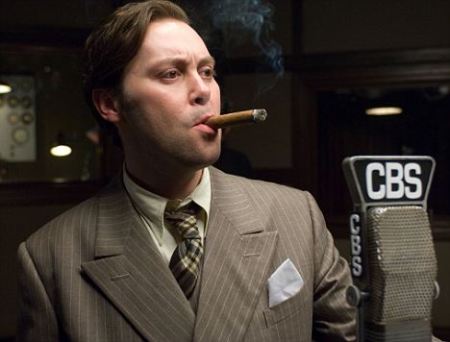Me And Orson Welles – or, the rise of Christian McKay
How many times have you seen a film with a supporting actor you’re either completely or partially unfamiliar with, and they’ve been so extraordinarily good that you’ve eagerly watched everything that they’ve ever done subsequently? I can think of only a few. Kevin Spacey in the one-two punch of Seven and The Usual Suspects; Ed Norton in Primal Fear; and, more recently, Christoph Waltz in Inglorious Basterds. (I’d also add Cate Blanchett in Oscar and Lucinda and Elizabeth so as to avoid accusations of sexism.)
To this list we can now add Christian McKay. Advance word on his performance in Richard Linklater’s Me And Orson Welles was stellar, but it doesn’t even come close to describing how he runs away with the film. Aside from McKay’s note-perfect, swaggeringly charismatic performances as Welles, this is a sweet but not particularly profound coming-of-age story, with an adequate but unexciting lead performance by Zac Efron as a young man who finds himself, virtually by accident, taking part in Welles’ groundbreaking fascist production of Julius Caesar in the 1930s, and becoming involved with the company’s stage manager, as played by Clare Danes. It’s Linklater in anonymous rather than arty mode, and some good gags and nice performances from a mainly British cast make the running time pass pleasantly enough.
But whenever McKay is on screen, it lifts several notches. This is partly because Welles gets all the best lines and most interesting dramatic situations, but mainly because it’s a brilliantly calibrated dramatic performance from McKay – there is one scene towards the end where Caesar is re-enacted (at pleasing detail and length) and you are effectively watching McKay, as Welles, as Brutus, and it’s electrifying. Yet watch the way in which McKay allows tiny hints of vulnerability to play off against the bravado, the almost aggressive charm and the bullying with which he treats his staff. He’s absent for the last 15 minutes or so, and is badly missed; I wanted there to be a stirring grand finale for him, because I cared so much more about him than the insipidity of Efron’s romantic entanglements. But then I suppose that Caesar is a fairly grand finale, after all – and this is all before Citizen Kane.
I don’t know what McKay will do now – he knows Welles inside out, after having played him in a one-man show for years, and it remains to be seen whether the inevitable boost that this film gives him will translate into other work of similar interest. But it’s well worth watching this film for his remarkable, charismatic and truly attention-grabbing performance.

Leave a comment